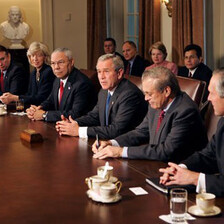The Chicago Tribune 13 October 2004
President Bush and Senator John Kerry have avoided mentioning the Palestinian-Israeli conflict in their campaigns. Politically, this is understandable. The Bush and Clinton administrations invested huge political capital in searching for a solution, and all their efforts lie in tatters as bloodshed continues to claim Palestinian and Israeli lives with no end in sight.
Americans, preoccupied with Iraq, increasingly see the Palestinian-Israeli dispute as an intractable ethnic conflict with no short-term solution. But even if it has faded from Americans’ consciousness, after four years of grinding Israeli-Palestinian fighting, the United States still has a direct stake in seeing this conflict resolved fairly.
In early October, Israeli Prime Minister Ariel Sharon’s top policy adviser, Dov Weisglass, dealt already dim prospects for peace a further heavy blow. Weisglass told the Israeli newspaper Ha’aretz that Sharon’s plan for “disengagement” from the occupied Gaza Strip was just a “maneuver” to “freeze” the peace process. He added, “When you freeze that process you prevent the establishment of a Palestinian state and you prevent a discussion on the refugees, the borders and Jerusalem. Effectively, this whole package called the Palestinian state, with all that it entails, has been removed indefinitely from our agenda. And all this with a presidential blessing and the ratification of both houses of Congress.”
This statement, if left unchallenged by U.S. action, confirms the worst suspicions of Palestinians, Arabs and Muslims that the United States is in cahoots with Israel to allow Israel to complete the colonization of the West Bank.
Once the U.S. presidential election is over, the commander in chief will need to turn his attention back to the conflict. Study after study shows that people all over the world view the U.S. as a biased party, often taking Israel’s side by vetoing United Nations resolutions critical of Israeli actions and supplying Israel with sophisticated weapons and billions of dollars in aid. In April Bush helped cement this perception by endorsing Sharon’s plan to annex most Jewish settlements in the occupied West Bank to Israel and to refuse to allow Palestinian refugees to return to their homes. Kerry was quick to second these positions.
While Arab-Americans and Muslims have been among those most critical of the Bush administration’s approach to the Israeli-Palestinian issue, and many have been deeply disappointed by Kerry’s failure to provide an alternative, we ought to look for the positive elements in Bush’s policies elsewhere that can be adopted to help bring peace.
During the second presidential debate in St. Louis last week, Bush said he had decided not to deal with Palestinian leader Yasser Arafat “because I felt like he had let the former president [Bill Clinton] down, and I don’t think he’s the kind of person that can lead toward a Palestinian state.” He added that Palestinians “need leadership that’s committed to a democracy and freedom.” Many Palestinians also feel that their leadership has failed, but want new leaders chosen by them, not imposed from the outside.
The next U.S. administration ought therefore to support efforts by Palestinians to hold free and fair elections. In recent weeks Palestinians have been trying to register voters in the occupied West Bank and Gaza Strip, but Israel has been blocking them. The Israeli government raided election offices in east Jerusalem and arrested poll workers, and in other areas registration has been impeded by Israeli blockades and curfews. The United States should unequivocally support elections among all Palestinians, elections that must do more than simply replace the failed leadership in the moribund Palestinian Authority.
One of the hopeful elements of Afghanistan’s presidential election, of which Bush is very proud, is that 740,000 Afghan refugees in exile in Pakistan were allowed to vote. This precedent should be adopted to allow Palestinian refugees in countries bordering Israel to participate in elections for a broad-based Palestinian negotiating body that could truly represent their interests on all issues relating to a final settlement, especially on the question of refugees. The exclusion of refugees from having a voice in their own future is one of the factors that undermined faith in the peace process and the Oslo Accords and led to their collapse.
At present, there are no Israeli or Palestinian leaderships that are willing and able to represent their people in good-faith negotiations. Eventually, Israeli voters will have a chance to choose a different vision than that represented by Sharon, and we must support them in doing so. The U.S. should also do all it can to support Palestinians so they have a similar opportunity to choose genuine representatives for the day when negotiations resume to bring about peace.
Ali Abunimah is co-founder of The Electronic Intifada and vice president of the Arab-American Action Network. This article first appeared in the Chicago Tribune on 13 October 2004 with the headling “Can’t ignore Mideast conflict.”




